The Irish Times view on the Estonian general election
The outgoing prime minister’s support for Ukraine appears to have been a key factor in her landslide victory
:quality(70)/cloudfront-eu-central-1.images.arcpublishing.com/irishtimes/E6Z6CGCXUIZPFWL24DXQDCF2TU.jpg)
Estonian prime minister, Kaja Kallas , whose party has won a landslide victory in the general election, speaks to the media in Tallinn
Mon Mar 6 2023 -
The election in Estonia has delivered a clear victory for outgoing prime minister Kaja Kallas and her centre-right Reform party. Estonia, like the other Baltic republics, Latvia and Lithuania, was an integral part of the Soviet Union before winning independence in 1991. The large shadow cast by its neighbour has been an important factor in shaping the country’s politics since, particularly after the launch of Moscow’s invasion of Ukraine.
Kallas’s term in office has been particularly notable for her strong support for Kyiv, which has been not just verbal but practical: in proportion to its size, Estonia has been the largest supplier of armaments to Ukraine and the biggest recipient of refugees.
The main opposition to Reform has come from the Eurosceptic, far-right EKRE party, which in the previous election in 2019 increased its vote from 8 per cent to 18 per cent. Its leader, Martin Helme, has stated that there can be no place for black people in Estonia while the party chairman criticised participants in a Pride demonstration and said it should not enjoy police protection. In the run-up to the election EKRE campaigned against hosting Ukrainian refugees and argued that Estonia should not needlessly antagonise Russia. It also put Reform on the defensive over an inflation rate of more than 18 per cent, much of it caused by rocketing energy bills which Kallas’s rigid free-market principles initially made her reluctant to see the state subsidising.
EKRE, however, found itself alone in the Estonian political landscape in urging a softer line with Russia. Even the Centre party, traditionally supported by the large ethnic Russian minority, was critical of Putin’s invasion, which cost it some electoral support. In the final results Reform added three seats and EKRE lost two. The entrance into parliament of the new liberal centrist formation Estonia 200 with 14 seats has widened Kallas’s political options. A coalition of Reform, Estonia 200 and the social democrats, that is of the centre-right, centre and centre-left, is one option that could provide a strong working majority.
Kallas, ‘Europe’s new Iron Lady,’ wins reelection in Estonia
Estonia’s first female prime minister has emerged as a leading hawk in the European Union by insisting Russia must be defeated in Ukraine.
CAIN BURDEAU / March 6, 2023
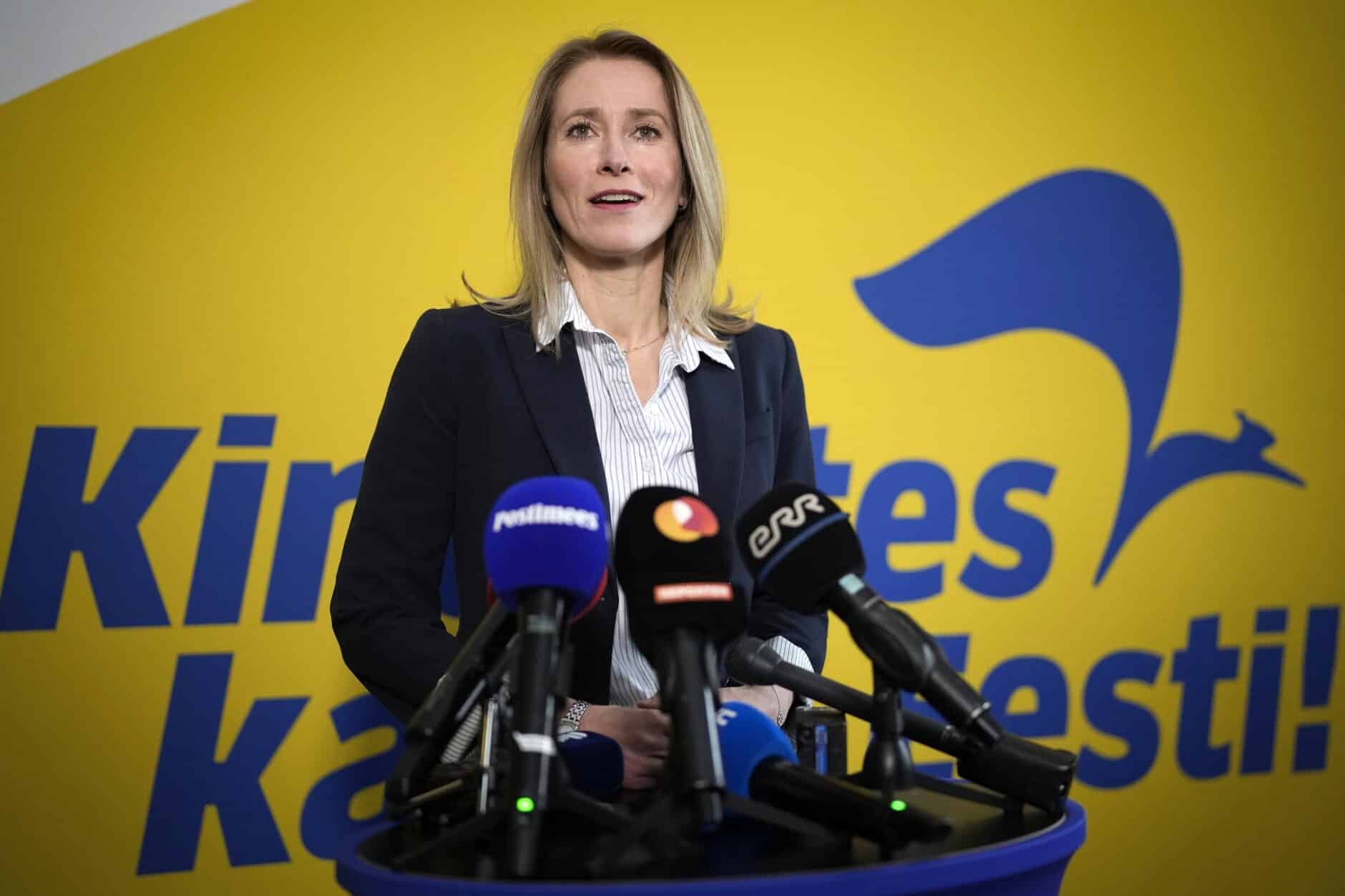
Estonian Prime Minister Kaja Kallas speaks at a news conference in Tallinn, Estonia, on Monday, March 6, 2023, after overwhelmingly winning the Baltic country's general election.
(CN) — Estonian Prime Minister Kaja Kallas, a staunch supporter of Ukraine who's been dubbed Europe's new “Iron Lady,” won reelection on Sunday in a landslide.
Kallas led her center-right neoliberal Reform Party to a resounding win by taking in about 32% of the votes, the most ever for a party since Estonia gained its independence in 1991. Her party is now expected to form a coalition government, possibly with the center-left Social Democrats and Estonia 200, a new liberal party.
Amid very high inflation in Estonia and signs of war fatigue emerging across Europe, there was some doubt about the level of support Kallas could rally.
Her success then was a big boost for European Union leaders, NATO and Ukraine because Kallas is one of Europe's most hawkish politicians in her support for Ukraine.
Also, the election was a setback for far-right nationalist forces in Europe with the Conservative People's Party of Estonia picking up about 15.7% of the vote, down from 17.8% in the last parliamentary elections in 2019. This party, also known by its Estonian acronym EKRE, has anti-EU and anti-immigrant views and it has advocated reducing Estonia's military support for Ukraine in order to bolster the country's own army.
In a tweet, Kallas said her win “shows that Estonians overwhelmingly value liberal values, security founded on EU and NATO, and firm support to Ukraine.”
With her ardent backing of Ukraine and calls for unlimited military aid to Kyiv, she's given her small country of 1.3 million people an outsized voice in the EU. Estonia is providing per capita more military aid to Ukraine than any other NATO country.
She's even been dubbed by media as Europe's new “Iron Lady” because of her resemblance to former British Prime Minister Margaret Thatcher's uncompromising stance on the Soviet Union.
Even before Russian President Vladimir Putin launched the invasion of Ukraine, Kallas was urging her counterparts in the EU to see Russia as a dangerous power bent on reconquering territories that Moscow once held.
Estonia was a former Soviet republic and shares a long border with Russia. Since Estonia gained independence, a large ethnic Russian population in Estonia has often felt marginalized because many Russian residents have been denied citizenship and accuse the state of mistreating them. About a quarter of Estonia's population is Russian.
The Baltic country has been a target of Russian meddling and cyberattacks, prompting its leaders, including Kallas, to warn that Moscow could attack the small country and use the plight of ethnic Russians in Estonia as a pretext for its aggression. Estonia, though, is a NATO member and a Russian attack is highly unlikely.
In a recent interview, Kallas said Ukraine has proven its strength after fighting off Russia's military and that it must be brought into the EU and safeguarded against Russia. She likened Ukraine's fight to that of Estonia's struggles for independence from the Soviet Union.
She said the war was “going much better than we thought even a year ago” because Ukraine “has survived” and the Western alliance has remained intact.
“Keeping this unity has been a big achievement for the European Union but also NATO,” she said.
Her anti-Russian stance can be traced to her personal family history too. Born in 1977 when Estonia was a Soviet republic, the 45-year-old prime minister comes from an elite Estonian family deeply involved in leading the fight for Estonia's independence from Russia in the first half of the 20th century. Her mother and grandmother also were among large numbers of Estonians deported by the Stalinist regime.
Her father, Siim Kallas, served as a Reform Party prime minister of Estonia between 2002 and 2003.
Courthouse News reporter Cain Burdeau is based in the European Union.
Estonia election analysis: Why the liberals won, the far-right lost, and other key takeaways
By David Mac Dougall • Updated: 06/03/2023 -

FILE: Estonian Prime Minister Kaja Kallas - Copyright AP Photo
The votes are all tallied, the winners declared, and the dust is settling on Estonia's first election since the COVID pandemic and the Russian invasion of Ukraine is over.
The makeup of the next parliament - Riigikogu - looks familiar but also different: at the previous election in 2019 there were five parties represented, but now six parties have made it over the 5% threshold and returned MPs.
Now talks begin to form the next government and here's where PM Kaja Kallas is hoping history doesn't repeat itself: in 2019 her Reform Party won the most seats in parliament but she was outflanked by right-wing parties who went on to form a coalition of their own.
So what did we learn from the campaign and the elections? Here's our key takeaways:
1. Strong new madate for Kaja Kallas and her Reform Party
Incumbent Prime Minister Kaja Kallas had a strong night, with her centre-right Reform Party picking up three new seats, while opponents further right in the political spectrum suffered losses. Estonia's public broadcaster ERR called it a "landslide" win as Reform extended its lead over the far-right EKRE party to 15 seats.
The win, Kallas said, "also shows that Estonians overwhelmingly value liberal values, security founded on EU and NATO, and firm support to Ukraine."
The new liberal bloc which has now emerged in Estonian politics could in theory mean that Reform would only need the support of one other party to form a majority government, but Kaja Kallas talked on the campaign trail about the need for building sustainable and solid alliances with other parties, so she's likely to look at two other parties with similar values to form her coalition: Estonia200 and the Social Democrats.
2. Big breakthrough for Estonia200 party
At the last general election in 2019, the Estonia200 party fell just short of the 5% threshold to return MPs to parliament. At the regional elections they sharpened their message, targeted seats in urban areas in particular where they felt their strengths and core support lay, and now translated this into national success with 14 seats in the Riigikogu -- and a likely spot in government.
So why has this liberal, centre-right party resonated now with voters? Party co-founder Kristina Kallas (no relation to Kaja Kallas) tells Euronews that her party succeeded by appealing to people across the political spectrum.
"At this election, people were looking for the option of a new, liberal force," says Kallas.
"In Tartu, where I campaigned, it's not just young liberal progressive voters worried about populism, it was also quite elderly people who might not be value-liberal as we understand it, but populism was also something they didn't want," she explains.
"Estonia200 brought more liberal voters out to vote, and to vote for a new party," says Kallas.
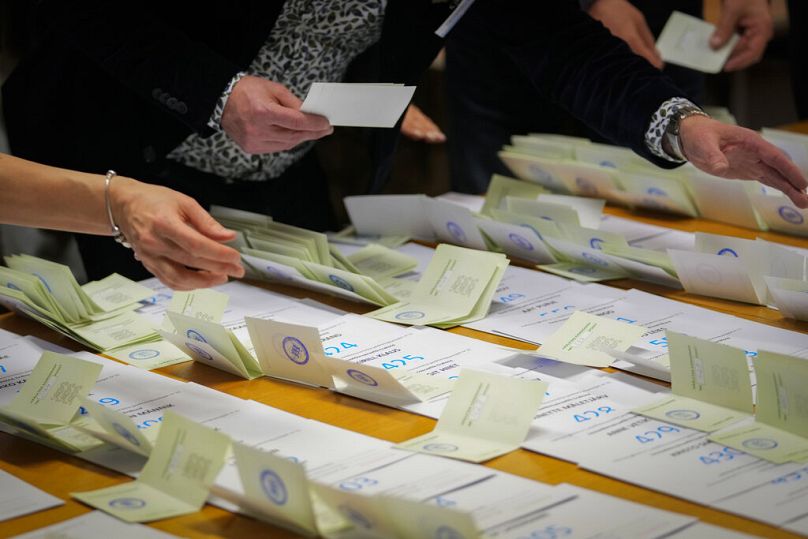 Electoral commission staff count ballot papers after voting closed at a polling station in Tallinn, Estonia, Sunday, March 5, 2023Sergei Grits/AP
Electoral commission staff count ballot papers after voting closed at a polling station in Tallinn, Estonia, Sunday, March 5, 2023Sergei Grits/AP
3. Parties on the right took a fall in support
"This year it seems to be more important who doesn't get the votes, than who does," one Estonian voter told Euronews on election day, and that feeling seems to have prevailed with a liberal, values-based centre-right bloc emerging strongly, while parties with more traditional views (Centre Party and Isamaa) or more polarising policies (EKRE) took a hit.
"Reform Party and EKRE presented themselves as the main opponents in the election, calling for supporters of other parties to vote for them to make sure that the other one does not stand a chance to become a prime minister's party," explains Merili Arjakas, a research fellow at the International Centre for Defence and Security in Tallinn.
"While EKRE's nominal loss of two seats is not major, they had expected to take over the Centre Party's position of being a strong second party with give-or-take of 25 seats. This did not happen," she tells Euronews.
Additionally, having the Social Democrats and Estonia200 fare better than in recent opinion polls also added salt to the the right wing's wounds.
"This is why there is a widespread perception that the nationalist right lost the election," says Arjakas.
The Centre Party's vote share was down more than 36,000 votes from the last election, likely lost due to a number of factors including a popular figure who was expelled from the party last year who ran as an independent; but the security situation, the war in Ukraine, a feeling of neglect or alienation among Russian-speaking voters who traditionally vote for the Centre Party, and generally lower level of political engagement.
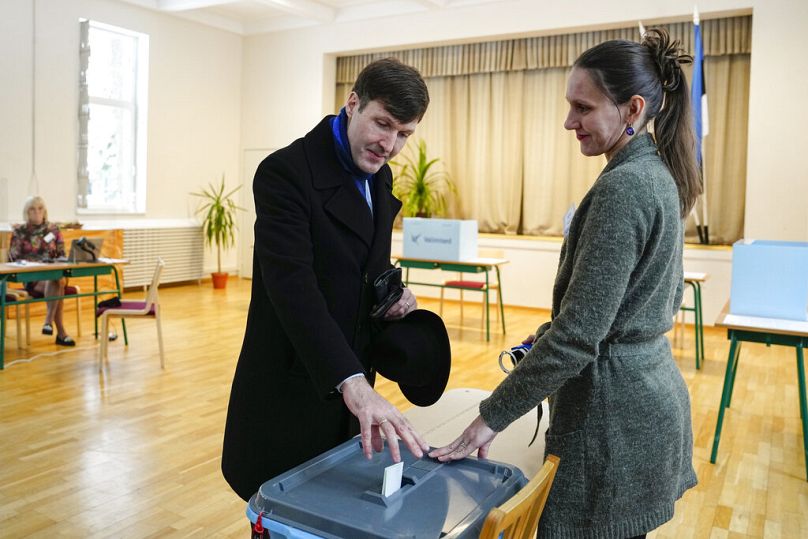 KRE), the candidate for Prime Minister Martin Helme casts his ballot at a polling station during a parliamentary elections in Tallinn, Estonia, Sunday, March 5, 2023.Pavel Golovkin/Copyright 2023 The AP. All rights reserved
KRE), the candidate for Prime Minister Martin Helme casts his ballot at a polling station during a parliamentary elections in Tallinn, Estonia, Sunday, March 5, 2023.Pavel Golovkin/Copyright 2023 The AP. All rights reserved
4. Internet voting is more popular, and trusted, than ever
For the first time in an Estonian election cycle, more than 50% of people cast their ballots on the internet. That's only possible because of the wide range of services that are available to Estonians online, the investment in system security that authorities have invested in, and the high level of trust the public has in the integrity of internet voting.
The fly in the ointment the after the votes were counted is that far-right party EKRE now reportedly wants to challenge those electronic ballots in court.
Kristi Raik, Deputy Director of the International Centre for Defence and Security in Tallinn, calls that a "Trumpist" move.
"EKRE is bringing into question the reliability of the voting procedure and wants to contest the e-vote in court. This is a dangerous game of undermining people’s trust in institutions," says Raik.
"The real reason being that EKRE gets relatively few e-votes."
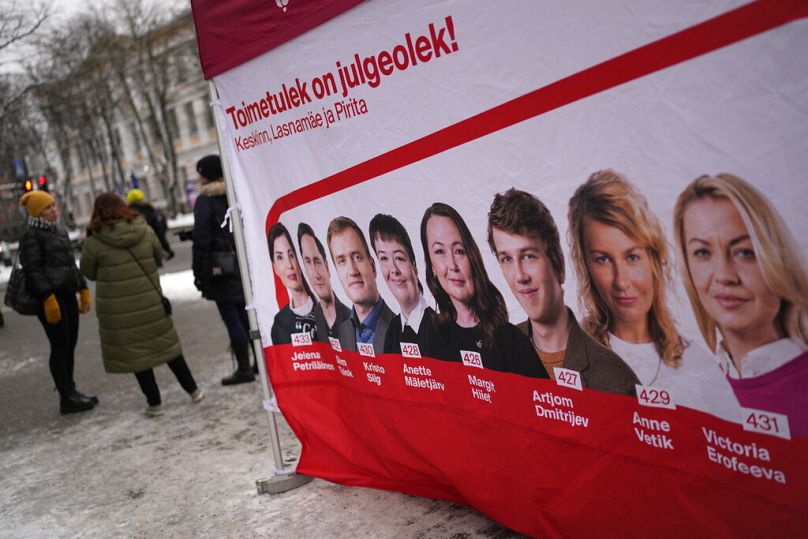 Activists speak with people near a campaign tent adorned with posters depicting candidates' portraits during parliamentary elections in Tallinn, Estonia, Sunday, March 5, 2023Sergei Grits/AP
Activists speak with people near a campaign tent adorned with posters depicting candidates' portraits during parliamentary elections in Tallinn, Estonia, Sunday, March 5, 2023Sergei Grits/AP
5. What happened to Russian-speaking voter turnout?
Estonia's Russian-speaking voters have found themselves a bit politically adrift in the last year or so. Although they have traditionally sided with the Centre Party, they felt let down when it comes to continuing Russian-language education in parallel with the Estonian-language education system.
EKRE had tried to woo them, and use the arrival of Ukrainian refugees as a wedge issue: but EKRE had also been very vocal about calling for the removal of Soviet-era monuments which could in turn alienate some Russian-speaking voters.
"Looking at the districts, the turnout was remarkably lower than national average in Ida-Virumaa county and a bit lower in Tallinna Kesklinna, Lasnamäe and Pirita districts, where many Russian-speakers in the country live," explains ICDS's Merili Arjakas.
While the methodology for calculating turnout has changed slightly in this year's elections, turnout in those Russian-speaking districts has always been lower than average.
1. Strong new madate for Kaja Kallas and her Reform Party
Incumbent Prime Minister Kaja Kallas had a strong night, with her centre-right Reform Party picking up three new seats, while opponents further right in the political spectrum suffered losses. Estonia's public broadcaster ERR called it a "landslide" win as Reform extended its lead over the far-right EKRE party to 15 seats.
The win, Kallas said, "also shows that Estonians overwhelmingly value liberal values, security founded on EU and NATO, and firm support to Ukraine."
The new liberal bloc which has now emerged in Estonian politics could in theory mean that Reform would only need the support of one other party to form a majority government, but Kaja Kallas talked on the campaign trail about the need for building sustainable and solid alliances with other parties, so she's likely to look at two other parties with similar values to form her coalition: Estonia200 and the Social Democrats.
2. Big breakthrough for Estonia200 party
At the last general election in 2019, the Estonia200 party fell just short of the 5% threshold to return MPs to parliament. At the regional elections they sharpened their message, targeted seats in urban areas in particular where they felt their strengths and core support lay, and now translated this into national success with 14 seats in the Riigikogu -- and a likely spot in government.
So why has this liberal, centre-right party resonated now with voters? Party co-founder Kristina Kallas (no relation to Kaja Kallas) tells Euronews that her party succeeded by appealing to people across the political spectrum.
"At this election, people were looking for the option of a new, liberal force," says Kallas.
"In Tartu, where I campaigned, it's not just young liberal progressive voters worried about populism, it was also quite elderly people who might not be value-liberal as we understand it, but populism was also something they didn't want," she explains.
"Estonia200 brought more liberal voters out to vote, and to vote for a new party," says Kallas.

3. Parties on the right took a fall in support
"This year it seems to be more important who doesn't get the votes, than who does," one Estonian voter told Euronews on election day, and that feeling seems to have prevailed with a liberal, values-based centre-right bloc emerging strongly, while parties with more traditional views (Centre Party and Isamaa) or more polarising policies (EKRE) took a hit.
"Reform Party and EKRE presented themselves as the main opponents in the election, calling for supporters of other parties to vote for them to make sure that the other one does not stand a chance to become a prime minister's party," explains Merili Arjakas, a research fellow at the International Centre for Defence and Security in Tallinn.
"While EKRE's nominal loss of two seats is not major, they had expected to take over the Centre Party's position of being a strong second party with give-or-take of 25 seats. This did not happen," she tells Euronews.
Additionally, having the Social Democrats and Estonia200 fare better than in recent opinion polls also added salt to the the right wing's wounds.
"This is why there is a widespread perception that the nationalist right lost the election," says Arjakas.
The Centre Party's vote share was down more than 36,000 votes from the last election, likely lost due to a number of factors including a popular figure who was expelled from the party last year who ran as an independent; but the security situation, the war in Ukraine, a feeling of neglect or alienation among Russian-speaking voters who traditionally vote for the Centre Party, and generally lower level of political engagement.

4. Internet voting is more popular, and trusted, than ever
For the first time in an Estonian election cycle, more than 50% of people cast their ballots on the internet. That's only possible because of the wide range of services that are available to Estonians online, the investment in system security that authorities have invested in, and the high level of trust the public has in the integrity of internet voting.
The fly in the ointment the after the votes were counted is that far-right party EKRE now reportedly wants to challenge those electronic ballots in court.
Kristi Raik, Deputy Director of the International Centre for Defence and Security in Tallinn, calls that a "Trumpist" move.
"EKRE is bringing into question the reliability of the voting procedure and wants to contest the e-vote in court. This is a dangerous game of undermining people’s trust in institutions," says Raik.
"The real reason being that EKRE gets relatively few e-votes."

5. What happened to Russian-speaking voter turnout?
Estonia's Russian-speaking voters have found themselves a bit politically adrift in the last year or so. Although they have traditionally sided with the Centre Party, they felt let down when it comes to continuing Russian-language education in parallel with the Estonian-language education system.
EKRE had tried to woo them, and use the arrival of Ukrainian refugees as a wedge issue: but EKRE had also been very vocal about calling for the removal of Soviet-era monuments which could in turn alienate some Russian-speaking voters.
"Looking at the districts, the turnout was remarkably lower than national average in Ida-Virumaa county and a bit lower in Tallinna Kesklinna, Lasnamäe and Pirita districts, where many Russian-speakers in the country live," explains ICDS's Merili Arjakas.
While the methodology for calculating turnout has changed slightly in this year's elections, turnout in those Russian-speaking districts has always been lower than average.
PM Kaja Kallas’ Reform Party set to win in Estonia vote
5 March 2023, 22:04
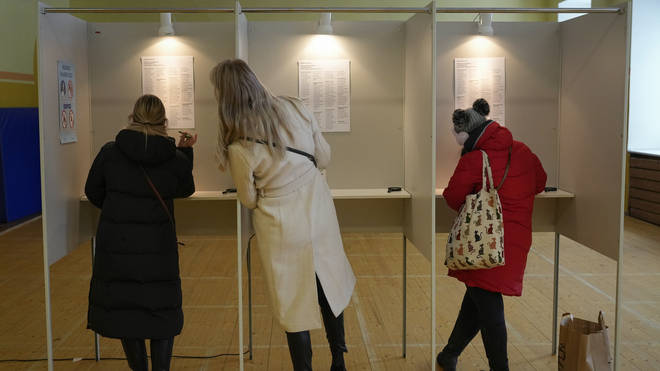
Nine political parties in all fielded candidates for Estonia’s 101-seat parliament, or Riigikogu.
Voters in Estonia have cast their ballots in a parliamentary election where initial results suggested the centre-right Reform Party of Prime Minister Kaja Kallas is on its way to a landslide victory.
Ms Kallas faced a challenge from the far-right populist EKRE party, which seeks to limit the Baltic nation’s exposure to the Ukraine crisis and blames the current government for Estonia’s high inflation rate.
Nine political parties in all fielded candidates for Estonia’s 101-seat parliament, or Riigikogu. More than 900,000 people were eligible to vote in the general election, and nearly half voted in advance.
With around 90% votes counted, Reform Party was in strong lead with 31.9% of the votes, followed by EKRE with 15.2% and the Centre Party, traditionally favoured by Estonia’s sizable ethnic-Russian minority, 14.5%.
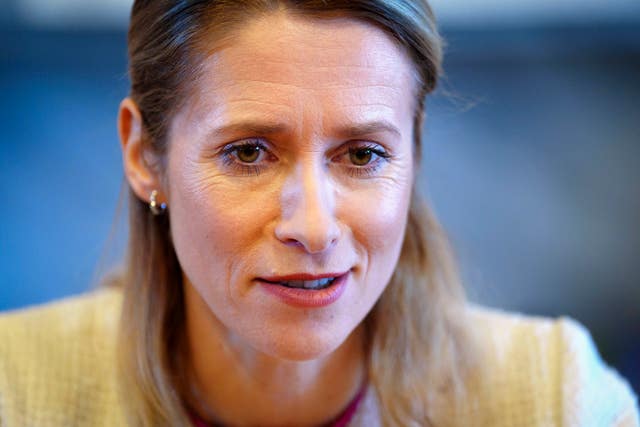
Preliminary results suggested six parties passed the 5% threshold of support needed to be in parliament, including newcomer Eesti 200, a liberal centrist party.
By the time polls closed at 8pm local time, the overall turnout was 63.7%, according to initial information – a rate on par with the 2019 election. Preliminary election results were expected by early Monday.
National security in the wake of neighbouring Russia’s invasion of Ukraine and socio-economic issues, particularly the rising cost of living, were main campaign themes.
Ms Kallas, 45, became prime minister in 2021 and has emerged as one of Europe’s most outspoken supporters of Ukraine during the year-long war.
She is seeking a second term, with her standing enhanced by her international appeals to impose sanctions on Moscow.
A Baltic nation of 1.3 million people that borders Russia to the east, Estonia broke away from the Soviet Union in 1991 and has taken a clear Western course, joining Nato and the European Union.
Five parties were represented in the outgoing parliament. Ms Kallas’ party has led the current coalition government with the small conservative Fatherland party and the Social Democrats.
Her centre-right Reform Party, a key player in Estonian politics since the mid-1990s, continuously held the prime minister’s post during 2005-2016 and regained it in 2021.
Polls indicated Ms Kallas’ party was likely to win the most votes in Sunday’s election. EKRE party leader Martin Helme, the prime minister’s main challenger, blames Ms Kallas for the country’s inflation rate of 18.6%, one of the EU’s highest, and accuses her of undermining Estonia’s defences by giving weapons to Ukraine.
“We’ve never questioned support for Ukraine. We’ve never questioned Estonia’s membership in Nato,” Mr Helme said in an interview with The Associated Press.
“That’s just crazy talk. But we have been very critical of the government because they have not assessed the risk to Estonia and to Estonian security and defence.”
“We have basically given away all our heavy weaponry to Ukraine, and the replacement comes within two or three years. Basically, that is an invitation of aggression,” he said.
The outspoken and polarising EKRE entered into the mainstream of Estonian politics in the 2019 election, when it emerged as the third-largest party with nearly 18% of the vote.
The eurosceptic party was co-founded by Martin Helme’s father, Mart Helme, and was part of a Centre Party-led government during 2019-21.
Ms Kallas argues it is in her country’s interests to help Kyiv. The full-scale invasion of Ukraine sparked fears in Tallinn that a Russian victory could embolden Moscow to switch its attentions to other countries it controlled in Soviet times, including Baltic nations Estonia, Latvia and Lithuania.
She says that Estonia’s defences remain strong as the United States and other Nato allies have supplied top-notch weapons like the Himars rocket system to Ukraine and also to Estonia.
No comments:
Post a Comment